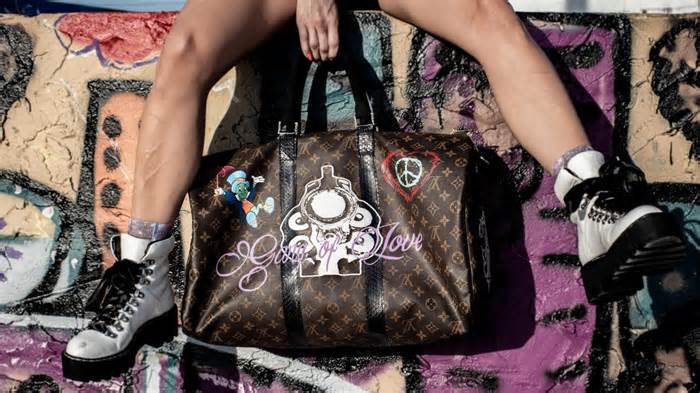When Miley Cyrus was spotted with a bag decorated with a giant marijuana leaf earlier this year, photographs went around the world, but while the music star is a longtime proponent of hashish legalization, some fashion connoisseurs felt her bag was another kind of statement: was produced through French designer and entrepreneur Philip Karto, who is temporarily making a call for himself with a diversity of recycled Louis Vuitton bags at a cost of over $3,500.
“Fashion is one of the worst industries in the world when it comes to recycling and sustainability,” Karto says of its range, which attempts to roll back some of the industry’s practices. “There is so much garbage. “
The designer retired from the fashion industry a decade ago, feeling uncomfortable with the unsustainable fabrics he uses and the giant volumes of his products that are slightly worn or thrown away.
Then, in 2017, everything changed. Karto borrowed a Louis Vuitton toe from his mother because he needed anything to carry his gym equipment. “It’s smart for the job, but a bit boring, so I custom-designed it with my own design,” he says. every time I took it out, I couldn’t go more than a few minutes without someone stopping on the street looking to know where I bought it.
Karto learned that he might have hit something. Very quickly, he bought another 4 Louis Vuitton bags, painstakingly dismantled them, then reassembled them, adding silver coins and snake or crocodile skins on one side and painted characters or items on the other. She then contacted an old friend who had a shop in the Montaigne market in Paris and asked if she would put them up for sale. All 4 were recovered within 24 hours.
For Karto, it was a kind of epiphany. In the past I had thought about returning to the fashion industry. He now had a potentially successful product that didn’t force him to compromise on his values. the industry can be recycled in this way,” he says.
Five years later, a company that Karto actually started as a non-public assignment has grown into a company in its own right. From his Miami studio, Karto now buys a large number of used Louis Vuitton bags, at auction, and then meticulously recycles them. It sells around 1,000 bags a year on average, although excluding periods of the Covid-19 pandemic when the outlets that inventoried their bags were closed, the figures are even more impressive.
These are not reasonable products: some of Karto’s bags charge more than $6,000, but demand is high. Celebrities are part of history, in addition to Miley Cyrus, stars such as Mike Tyson, Bella Hadid, Puff Daddy, Floyd Merriweather, Cassie and the Los Angeles Lakers basketball team have been spotted with Karto bags. .
So the company’s good luck is drawing attention: is there room for other designers to put more emphasis on sustainability, either with the fabrics they use in the production process or with their attitude towards recycling?”That’s the future, I’m sure. ” It says Karto. Es continue as we are. “
For its part, 2022 can be a great year: Karto expects to open 3 iconic Philip Karto outlets next year, potentially in Miami, in the south of France, where it is from, and in the Middle East. inventory an expanded diversity of its products.
One option is to repeat Louis Vuitton’s delight with bags from other designers: Hermes or Goyard are possibilities, says Karto. The designer also plans to revisit a diversity of clothing he unveiled at the end of 2019, with pieces all assembled from recycled fabrics. – even though I was suspicious when the Covid-19 crisis caused so much disruption.
Karto is also in talks with several brands about collaborations on a topic, although for now it remains discreet. Sustainability issues will feature prominently in such projects, he promises.
In a sense, Karto’s good fortune is a classic example of one of the ultimate fundamental advice marketers get: the maximum of lucky businesses growing from anything the founder is passionate about, but there’s also a broader lesson here, even in industries that in the past felt far removed from the sustainability debate. it demands adjustments in perspectives, and brands are the fastest to adapt and reap the benefits.
However, Karto insists that the key is not to lose sight of the product and what makes it special. In his case, the logo was based on his love of art and design. “It’s a genuine combination of art and fashion,” says Karto. of its range. ” These models are one hundred percent handmade, however, they are sold in points of sale than in galleries. “

